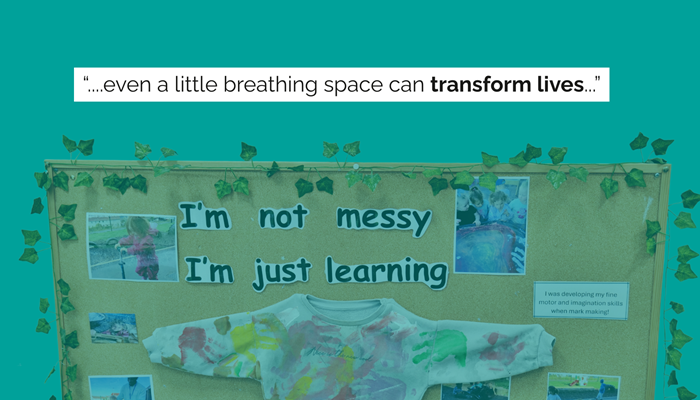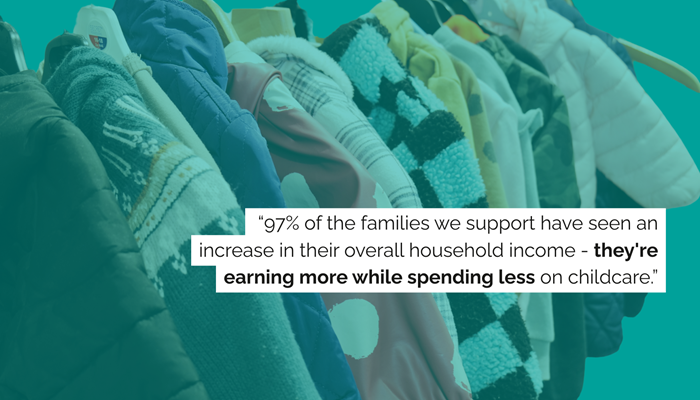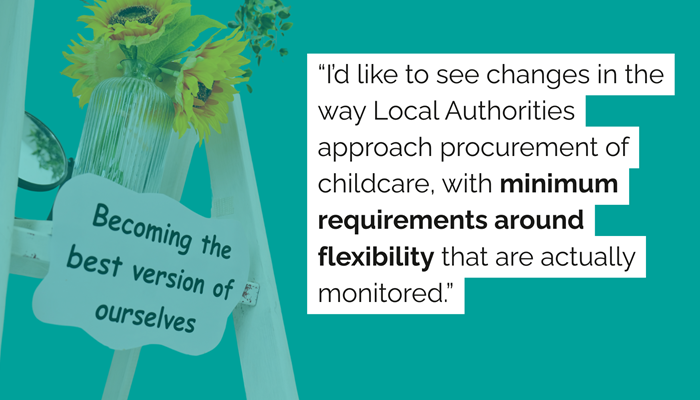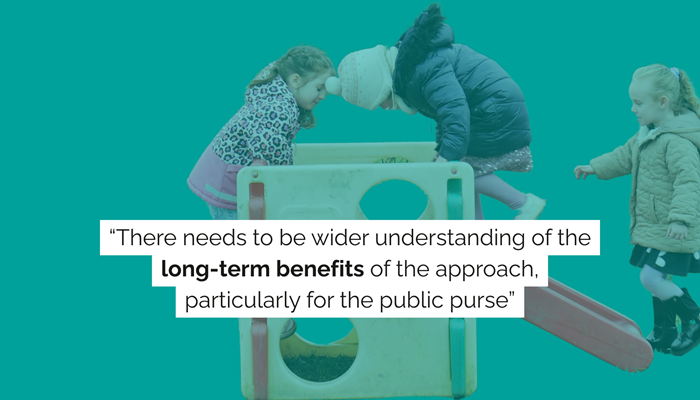
"Right now, childcare policies are failing a quarter of families in Scotland, and that simply isn’t acceptable." Susan McGhee, Chief Executive
What is Flexible Childcare Services Scotland working to achieve?
We want to drive change in the current childcare model and ensure flexibility is at the heart of childcare policies.
The existing system has remained unchanged for decades and fails to reflect the way people live and work today. This lack of flexibility is preventing many from returning to work, pursuing further training, or accessing education. It’s common sense but offering a model where childcare is bookable by the hour can change this – we have seen firsthand how it can create a significant impact for both individuals and the community as a whole.
Where are you focusing your support right now?
Supporting wider adoption of the model across childcare providers, particularly within areas of deprivation. We have spent the last five years refining the model to make it sustainable, and now we are focused on developing tools that we can share with others to move things forward. Our software is part of this, we understand the critical factors that make the model work and are now pulling that together to create a blueprint which looks at different ways it could be applied depending on an area’s needs.
We recognise that not every family needs flexible childcare, though demand is growing, and not every setting requires the full model. Our approach allows for a percentage of flexible spaces to be made available based on data insights. Some of our settings also offer wraparound support to ease pressure on families, including food banks, clothing exchanges, and toy lending libraries. At Cummings Park Nursery in Aberdeen, we’ve recently partnered to have the local Health Visitor based on-site. Additionally, we now provide specialist and complex care for children with Additional Support Needs through our ELC settings and dedicated ASN Groups and Clubs.

What elements of your service or activities have made the biggest difference for those you work with?
The biggest impact is undoubtedly the flexibility. According to our latest research, 97% of the families we support have seen an increase in their overall household income - they're earning more while spending less on childcare. This reduces stress, and many parents tell us it allows them to spend more quality time with their children.
We've seen parents return to work after a break, often starting in entry-level roles before progressing in their careers. Others have been able to continue working in their chosen fields or return to education. In one case in Aberdeen, a parent who was able to continue her hairdressing career went on to open her own salon, now employing other local mums. Stories like this demonstrate the potential long-term benefits of the approach.
Notably, a large proportion of the parents we support work in care and healthcare, where irregular shifts make traditional childcare inaccessible. At a time when the NHS is struggling to recruit, this impact is something more people need to be aware of.
Beyond childcare, our wraparound support also plays a crucial role. While families may not always explicitly say that services like food banks or clothing banks are essential, we see how well used they are. We've also found real benefits in having attached family spaces for additional support. Not every setting has the capacity, but this should be considered when designing childcare facilities. If families already feel comfortable and confident in these spaces, why not integrate other services that could benefit them?

How do poverty and trauma figure in your work?
Nearly 70% of the families we support are in groups identified as at risk of poverty in the Tackling Child Poverty report, with most others on low incomes just above the threshold. Flexible childcare isn’t a cure-all, but it’s a simple solution that puts extra money in families' pockets every year. Seeing the real impact - how even a little breathing space can transform lives - has only strengthened my commitment to pushing for wider change. Right now, childcare policies are failing a quarter of families in Scotland, and that simply isn’t acceptable.
How can funders support your work?
Funding is a constant challenge, particularly when it comes to scaling successful models. If we know something works, how do we expand it? I'd also love to see more frameworks that bring different funding partners together around a single project. Producing multiple reports for different funders covering the same work is a huge drain on resources - streamlining this process would make a real difference.
On a very practical level, funders can come out and visit us. I can talk about the benefits of flexible childcare until the cows come home, but I can’t convey it as well as actually seeing it. We are all working with capacity and budget restrictions, so I appreciate it’s not always easy, but I do think it’s so, so important to see the work in action.
What are the biggest challenges/barriers facing you as an org and/or those you work with/support?
Convincing others to try the model can be challenging. Because we let people book flexibly, occupancy rates are around 70%, whereas commercially you’d be looking for as close to 100% as you could possibly get. Staffing costs are also more, partly because we pay the Living Wage, but also because we generally have to employ extra people to maintain ratios when our team are attending meetings such as teams around the Child. The demographic we work with in areas of multiple deprivation often have multi agency involvement and we have to build that capacity into staffing plans.
This means it takes two to three years to reach sustainability. In order to scale we need to be able to find financial support to fill that gap during the initial period. It is absolutely vital that you work with a Local Authority committed to the model. We also want more people and organisations to recognise the wider benefits of having flexible childcare available in their local area – for example, in areas where it is tough to recruit, is there long-term value in local businesses pulling together to provide space and subsidised support?

What changes would you like to see in your area of focus during the next decade?
Policy changes that ensure everybody has access to the flexibility they need. Childcare is part of this, but also within work. We already know families using our services are better off financially, but what extra improvements in their lives are possible if they’ve got access to flexible working too?
Longer-term, I’d like to see changes in the way Local Authorities approach procurement of childcare, with minimum requirements around flexibility that are actually monitored.
There needs to be wider understanding of the long-term benefits of the approach, particularly for the public purse – in fact, I would love to commission a piece looking into this, measuring the savings made through more families to return to work (claiming less benefits, paying more taxes etc…). There needs to be more recognition that childcare spans various policy areas – if we are genuinely meeting the needs of families and tackling child poverty, it’s vital that different Government departments work together and recognise the importance of this work.

Flexible Childcare Services Scotland (FCSS)
FCSS provide flexible early learning and school age childcare for families with children of all ages.
The flexibility of its model allows parents to book by the hour, pay as they go and use their funded entitlement flexibly as well.
All of its services are designed to remove childcare as a barrier to working, studying or accessing respite.
In 2023, FCSS received a £250,000 Programme Award from The Robertson Trust to test and demonstrate its flexible approach to childcare.
The organisation recently launched its new 5-year strategic plan. You can read this here.
